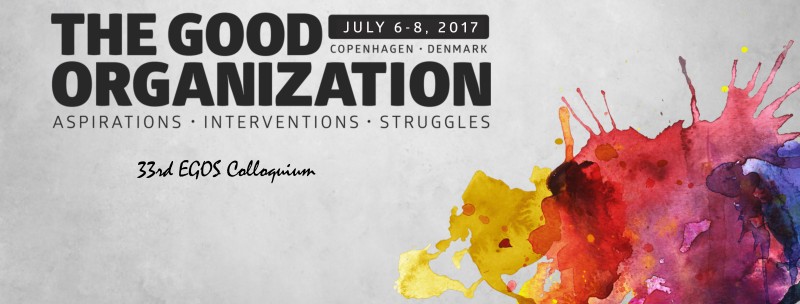Sub-theme 66: Organizational Capability Building: Dynamics, Creative Processes, Failures
Call for Papers
The sub-theme calls attention to the key role of capability building for the successful development of firms and other
organizations and opens up for studies on various stages and contexts of capability building, as well as explanatory factors
and implications. Considering both individual (Vuori & Huy, 2015) and organizational factors such as routines, organizational
culture, formal and informal structures for capability building and evolvement, the sub-theme will explore their dynamics,
successes and failures. Furthermore the sub-theme will examine how external factors such as institutions (Delmas, 2002), networks
(Elango & Pattnaik, 2007) and ownership structures (Chen et al., 2014) might support or obstruct capability building and
evolvement in organizations. A special emphasis will be given the role of creative processes and knowledge development, as
part of capability building. To build and evolve organizational capabilities for complex challenges, e.g. innovation in complex
product/systems or adaptation to turbulent environments, the sub-theme suggests that organizations need to cross knowledge
boundaries, integrate internal specialists, as well as acquire and integrate advanced external knowledge. The sub-theme will
also open up for discussions concerning different barriers such as path dependence in the organizational capability building
process.
As part of these ambitions, the sub-theme seeks contributions from several research fields, from
micro-level studies of individual/group interaction, to macro-oriented analyses of organizations and networks. The sub-theme
encourages discussion regarding the mechanisms for capability building and evolvement using the lenses of for example learning
including learning from failure, knowledge integration (Berggren et al., 2011, Karabag & Berggren, 2016), innovation and
renewal (Schreyögg & Kliesch-Eberl, 2007) and boundary crossing (Carlile, 2002).
The sub-theme invites
conceptual and empirical studies that highlight how organizations build, sustain and renew their capabilities. The building
and evolvement of capabilities are time-dependent processes, the sub-theme therefore invites, but is not restricted to, papers
based on a process view and longitudinal studies. The proposed sub-theme particularly invites contributions that focus on
one or more of the following issues:
- How does capability building take place in different organizational contexts: start-ups, emerging economy firms, multinational companies, NGOs, government agencies?
- How do external and internal factors interact in organizational capability building?
- What are the mechanism of capability development in different types of organizations and industries (e.g. creative industries, IT or Professional Service firms)?
- How do organizations build capabilities for integrating internal and external knowledge?
- How do organizations suffer from path dependence and other barriers in capability renewal? What are the major failures?
- What are the dynamics of persistence and change in capability renewal?
- How are ethical issues taken up incapability building?
- How do initial conditions imprint later capability renewals?
- How do self-reinforcing processes influence capability building?
- What kinds of tools and skills are used for building specific capabilities?
The sub-theme intends to foster an exchange
of theoretical ideas and empirical research results across these and related issues. Papers that discuss such issues empirically
or conceptually, with regard to recent or more historical developments, are cordially invited.
The sub-theme
wishes to attract both high-quality contributions that are ready to be submitted to a research journal as well as research
in progress that explores these challenging issues. It seeks to provide an opportunity for engaging in constructive dialogue
and to encourage mutual learning among the participating scholars.
References
- Berggren, C., Bergek, A., Bengtsson, L., Hobday, M., & Söderlund, J. (eds.) (2011): Knowledge Integration and Innovation. Critical challenges facing international technology-based firms. Oxford: Oxford University Press.
- Carlile, P.R. (2002): “A pragmatic view of knowledge and boundaries: Boundary objects in new product development.” Organization Science, 13, 442–455.
- Chen, X., Chen, A.X., & Zhou, K.Z. (2014): “Strategic Orientation, Foreign Parent Control, and Differentiation Capability Building of International Joint Ventures in an Emerging Market.” Journal of International Marketing, 22 (3), 30–49.
- Delmas, M.A. (2002): “Innovating against European rigidities: institutional environment and dynamic capabilities.” The Journal of High Technology Management Research, 13 (1), 19–43.
- Elango, B., & Pattnaik, C. (2007): “Building capabilities for international operations through networks: a study of Indian firms.” Journal of International Business Studies, 38 (4), 541–555.
- Karabag, S.F., & Berggren, C. (2016): “Struggling with Knowledge Boundaries and Stickiness: Case Studies of Innovating Firms in an Emerging Economy.” In: F. Tell, C. Berggren, S. Brusoni & A. van de Ven (eds.): Managing Knowledge Integration Across Boundaries. Oxford: Oxford University Press.
- Schreyögg, G., & Kliesch‐Eberl, M. (2007): “How dynamic can organizational capabilities be? Towards a dual‐process model of capability dynamization.” Strategic Management Journal, 28 (9), 913–933.
- Vuori, T.O., & Huy, Q.N. (2015): “Distributed Attention and Shared Emotions in the Innovation Process. How Nokia Lost the Smartphone Battle.” Administrative Science Quarterly, 61 (1), 9–51.


